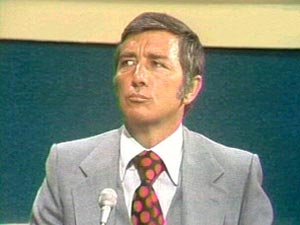Richard Dawson dead at 79
Richard Dawson, the British actor who went from comedy co-star in the popular TV series “Hogan’s Heroes” to his best-known role as the charming host of the TV game show “Family Feud” with his trademark of kissing the female contestants on the lips, has died. He was 79.
Dawson died Saturday at Ronald Reagan UCLA Medical Center from complications related to esophageal cancer. The actor, who had been living in Beverly Hills, was diagnosed with the disease about three weeks ago – said his son Gary.
“The way he was on the game show was the way he was in real life” – Gary Dawson said Sunday. “He was always rooting for people — he not only wanted people to win, but to have a comfortable, great experience.”
Dawson’s easy-going style topped with a Cockney accent were evident in his early films in the 1960′s such as “King Rat,” “Munster Go Home” and “The Devil’s Brigade,” while his quick wit distinguished him both as a game show contestant in the 1970′s on “Match Game” and “I’ve Got A Secret,” and as a performer on “The New Dick Van Dyke Show” and “Rowan and Martin’s Laugh-In,” where he was a regular cast member for two years.
The actor gained much of his popularity with American audiences from “Hogan’s Heroes,” the CBS series about a World War II prisoner-of-war camp that ran from 1965 to 1971. Dawson played Cpl. Peter Newkirk, an expert safecracker who was also adept at picking pockets.
Richard Dawson, the wisecracking British entertainer who was among the schemers in the 1960′s sitcom Hogan’s Heroes and a decade later began kissing thousands of female contestants as host of the game show Family Feud has died. He was 79.
Dawson, also known to TV fans as the Cockney POW Cpl. Peter Newkirk on Hogan’s Heroes, died Saturday night from complications related to esophageal cancer at Ronald Reagan Memorial hospital – his son Gary said.
The game show, which initially ran from 1976 to 1985, pitted families who tried to guess the most popular answers to poll questions such as “What do people give up when they go on a diet?”
Dawson won a daytime Emmy Award in 1978 as best game show host. Tom Shales of The Washington Post called him “the fastest, brightest and most beguilingly caustic interlocutor since the late great Groucho bantered and parried on You Be Your Life.” The show was so popular it was released as both daytime and syndicated evening versions.
He was known for kissing each woman contestant, and at the time the show bowed out in 1985, executive producer Howard Felsher estimated that Dawson had kissed “somewhere in the vicinity of 20.000.”
The career of Richard Dawson, who died Sunday at age 79, breaks down, broadly speaking, into two not unrelated parts, each of which displayed and depended upon a certain roguish, vaguely foreign charm.
American audiences first got to know him as Cpl. Peter Newkirk on the prisoners-of-war sitcom “Hogan’s Heroes”. Later we grew to love him as the first and still most famous host of “Family Feud” for the entirety of its first run (1976-85) and for the final season of its second (1994-95), after which he retired from show business.
The mid-1960′s was a good time to be English in America. Even if you were only halfway so – the British-born Dawson’s father was American. It was the age of the Beatles and Bond, and to my own impressionable eye, this made Dawson’s Newkirk – even more than star Bob Crane’s Col. Hogan – the most attractive member of the cast. There was a knowingness to the character that was not quite a naughtiness, a Cockney cocksureness, a streak of larceny appealingly turned to heroic ends.
These qualities Dawson imported, because they may have in some way been native to him, into his post-”Hogan” career, first as a cast member on “Rowan & Martin’s Laugh-In,” already in progress, and then on the deceptively hip 70′s version of “Match Game,” for which the contest itself was less the point than the loose banter of the panelists. Then came “Family Feud” – perhaps the most American of great American game shows, with its contestants representing unity and diversity – where he dispensed innumerable kisses and compliments and kept order with a gently ironic edge.
Apart from “Hogan,” Dawson’s other acting appearances, which included several episodes of the underrated “The New Dick Van Dyke Show” and a dark inversion of his “Family Feud” persona in the 1987 Arnold Schwarzenegger sci-fi film “The Running Man,” were few; a psych-pop single, “Apples and Oranges,” from 1967, led nowhere, but it remains an interesting artifact of its time.
He was above all a television personality, which has sometimes been described as “being famous for nothing.” In fact, it requires a particular set of talents, by no means easy to come by – quickness, confidence and the ability to be amusing, accessible and alive on a TV screen.
The sort of programs in which Dawson specialized for most of his career are those in which viewer and viewed are at their least remote, where living room and stage set become a single shared space – You don’t watch these shows so much as hang out in them.
